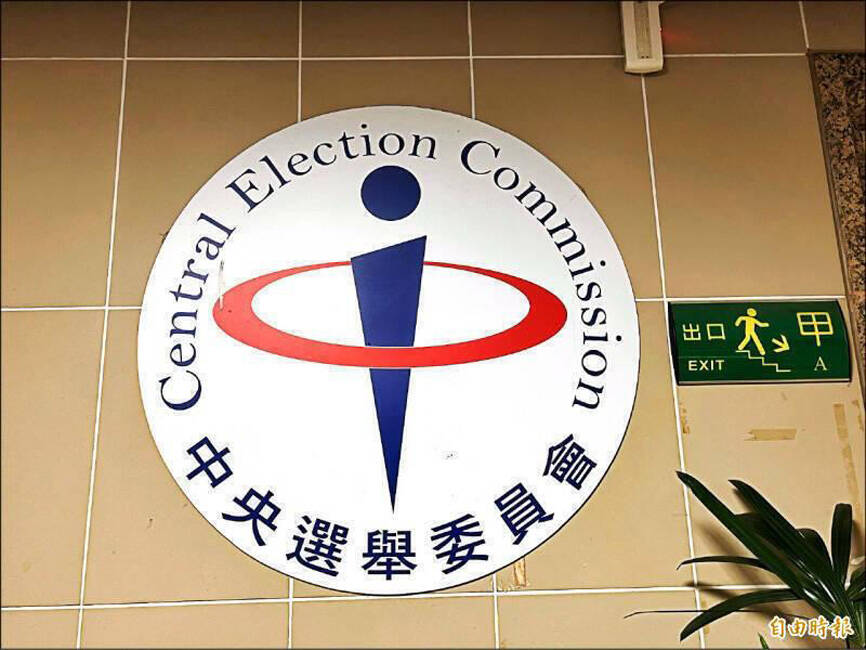Whether two referendum proposals submitted by the Chinese Nationalist Party (KMT) align with legal definitions in the Referendum Act (公民投票法) needs to be discussed from a broader perspective, the Central Election Commission (CEC) said on Friday.
The issue needs “collective consideration and review from multiple perspectives” in society, it said in a statement.
On Tuesday, the Legislature passed a motion advancing the KMT’s proposals to a second reading without committee review.

Photo: Taipei Times file photo
The proposed referendums are aimed at asking voters their views on capital punishment, which is legal in Taiwan, although rarely enforced; and on “martial law,” which evokes the 38-year period of authoritarian KMT rule prior to Taiwan’s democratization beginning in the late 1980s.
The referendum proposal framed as “opposing the abolition of the death penalty” would ask voters: “Do you agree that judges in a collegiate panel at all levels of courts do not need unanimous agreement to sentence a defendant to the death penalty?”
The referendum proposal “opposing martial law” would ask: “Do you agree the government should avoid war and prevent Taiwan from becoming a place of martial law, where youth die and homes are destroyed, as in Ukraine?”
The KMT’s move to put the two issues to a public vote would be the first time a referendum is initiated by the legislature rather than by political parties or civic groups.
Such proposals are limited to initiatives or referendums on major policies, according to the Referendum Act, while proposals submitted by political parties and civic groups can also include initiatives on legislative principles and referendums on laws.
CEC Chairman Lee Chin-yung (李進勇) on March 21 said the opposition party’s proposed referendum questions “would have no effect even if passed,” because asking the government not to implement a policy that does not currently exist is illogical.
The act stipulates that referendum proposals must pertain to significant policy changes, either by introducing new policies or reversing existing ones, Lee said.
“The CEC hopes that the first referendum proposal submitted by the legislature will proceed in full compliance with the law,” he said, adding that the issue “requires collective consideration and review from multiple perspectives.”
It was not clear if Lee had seen the actual questions proposed at the time, as the question proposed on the death penalty is not consistent with its public framing.
On Friday, Democratic Progressive Party lawmakers occupied the podium at the legislature in an attempt to block the confirmation of the meeting minutes from Tuesday.
However, their action was in vain, as Legislative Speaker Han Kuo-yu (韓國瑜) did not show up to announce the start of the session, meaning that it did not take place.

A preclearance service to facilitate entry for people traveling to select airports in Japan would be available from Thursday next week to Feb. 25 at Taiwan Taoyuan International Airport, Taoyuan International Airport Corp (TIAC) said on Tuesday. The service was first made available to Taiwanese travelers throughout the winter vacation of 2024 and during the Lunar New Year holiday. In addition to flights to the Japanese cities of Hakodate, Asahikawa, Akita, Sendai, Niigata, Okayama, Takamatsu, Kumamoto and Kagoshima, the service would be available to travelers to Kobe and Oita. The service can be accessed by passengers of 15 flight routes operated by

Alain Robert, known as the "French Spider-Man," praised Alex Honnold as exceptionally well-prepared after the US climber completed a free solo ascent of Taipei 101 yesterday. Robert said Honnold's ascent of the 508m-tall skyscraper in just more than one-and-a-half hours without using safety ropes or equipment was a remarkable achievement. "This is my life," he said in an interview conducted in French, adding that he liked the feeling of being "on the edge of danger." The 63-year-old Frenchman climbed Taipei 101 using ropes in December 2004, taking about four hours to reach the top. On a one-to-10 scale of difficulty, Robert said Taipei 101

Taiwanese and US defense groups are collaborating to introduce deployable, semi-autonomous manufacturing systems for drones and components in a boost to the nation’s supply chain resilience. Taiwan’s G-Tech Optroelectronics Corp subsidiary GTOC and the US’ Aerkomm Inc on Friday announced an agreement with fellow US-based Firestorm Lab to adopt the latter’s xCell, a technology featuring 3D printers fitted in 6.1m container units. The systems enable aerial platforms and parts to be produced in high volumes from dispersed nodes capable of rapid redeployment, to minimize the risk of enemy strikes and to meet field requirements, they said. Firestorm chief technology officer Ian Muceus said

MORE FALL: An investigation into one of Xi’s key cronies, part of a broader ‘anti-corruption’ drive, indicates that he might have a deep distrust in the military, an expert said China’s latest military purge underscores systemic risks in its shift from collective leadership to sole rule under Chinese President Xi Jinping (習近平), and could disrupt its chain of command and military capabilities, a national security official said yesterday. If decisionmaking within the Chinese Communist Party has become “irrational” under one-man rule, the Taiwan Strait and the regional situation must be approached with extreme caution, given unforeseen risks, they added. The anonymous official made the remarks as China’s Central Military Commission Vice Chairman Zhang Youxia (張又俠) and Joint Staff Department Chief of Staff Liu Zhenli (劉振立) were reportedly being investigated for suspected “serious